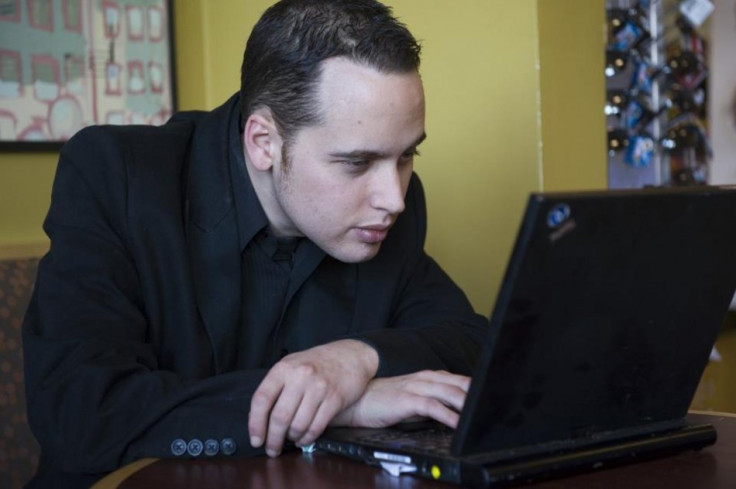EXCLUSIVE: Hacker Adrian Lamo Who Betrayed Wikileaks' Manning Turns Fire on Anonymous
Legendary hacker Adrian Lamo, who turned in Wikileaks source Bradley Manning, warns of Anonymous threat and criticise role of media in depicting the collective.

Adrian Lamo, dubbed the "world's most hated hacker" after he exposed the alleged Wikileaks source Bradley Manning to the US authorities, has poured scorn on the myth of Anonymous's power and influence, in an exclusive interview with the IBTimes UK.
The Boston-born Lamo, 31, who is now an outcast from the hacker underground, condemned Anonymous as "an illogical continuation of hacker activity" that needs to be de-escalated by the media.
The ex-hacker, who was once feted for his attacks on the servers at The New York Times, WorldCom and Microsoft, warns of media misrepresentations that make Anonymous appear almost unbeatable. According to the Colombian-American, Anonymous enjoys a rather big "PR success" among media organisations, and it is not being effectively questioned by journalists.
"There's a societal trend to make Anonymous appear rather larger than life, cheerleaded by Anonymous themselves, various security and threat analysis firms who benefit from the added stress on the market, and by the media itself which well knows the public is head-over-heels for a vaguely human villain," he told the IBTimes UK.
Taking for instance the latest attack on the US Department of Justice, in which Anonymous claimed to have stolen and posted 1.7 gigabytes of data, Lamo stresses that the collective hacked only "a sub-office in charge of compiling crime statistic".
"Nothing seriously classified, no major data breach, no 'DOJ [Department Of Justice] hack' as implied and no far-reaching consequences," he said.
"Yet, all too many outlets see 'DOJ' and 'hacked' in the same breath and go hog-wild."
"I don't want to minimise a significant hack, just to state the real value of the attack," he said.
Fact-checking and Anonymous
According to Lamo, Anonymous needs to be fact-checked by media organisations otherwise "it can be emboldened to carry out more ambitious targets".
"Anonymous is a loosened collective, eventually associated with everyone who takes their name, there is no war being waged against them ," he added. "I can see no rational point in what they're doing."
However, according to Lamo, Anonymous' members are not all unreasonable. "I have an ongoing dialogue with people at the senior levels of the collective," he claims.
Bringing personal hacking examples such as when he "edited news on 9/11, redacted the bonuses of Telecom company executives and accessed personal information of virtually every Internet users in the US", Lamo warns of the possibility that this can happen again.
"Maybe I was lucky at the time, but I saw things differently," he said. "I want to preclude the possibility that this can happen again."
In order to do that, it is necessary to "de-escalate Anonymous and make sure that it is factual" to avoid triggering a sense of invulnerability in the hacktivists' minds.
For instance, Lamo opposes Anonymous' frequent strategy of using Distributed Denial of Service (DDoS) attacks during their cyber-campaigns. A DDoS attack involves multiple compromised systems, usually infected with a Trojan, targeting a single system, forcing it offline - requires no particular IT skills, he says.
First Wikileaks, now Anonymous
Lamo, who suffers from Asperger's, a mental condition known as the "geek syndrome", is currently in hiding as after receiving death threats for turning in Manning, who was arrested in May 2010 in Iraq on suspicion of having passed classified material to the whistleblower website Wikileaks.
He has never expressed remorse for passing the details of an Internet conversation with the US Army intelligence analyst on 21 May 2010 to the authorities. Five days later Manning was arrested on duty at Base Hammer outside Baghdad. He is charged with multiple counts of conveying state secrets to Wikileaks including hundreds of thousands of US embassy cables.
Wikileaks founder Julian Assange called him "a very disreputable character".
"Julian Assange's claimed credit but he cost thousands of lives," countered Lamo. "His dismissal of prospective deaths of Afghan informants [was described] as "deserving" of death, according to those present. I have profile[d] this threat and that of Anonymous, at length."
But Lamo was denounced as a "snitch" by fellow hackers and booed at the Hackers On Planet Earth conference in July 2010.
Manning was 22 when arrested, the same age as Lamo when he was detained for computer intrusion after The New York Times hack. But Lamo is convinced he that he did the right thing.
"I never did harm, or demanded money, and offered to help my victims, free."
"Before I became a threat analyst for my current client, and before my myriad cooperation with the military to mitigate the less warm and fuzzy Wikileaks threat that most people don't see [...] I was a less morally evolved, prolific intruder," he told the IBTimes UK.
© Copyright IBTimes 2025. All rights reserved.






















